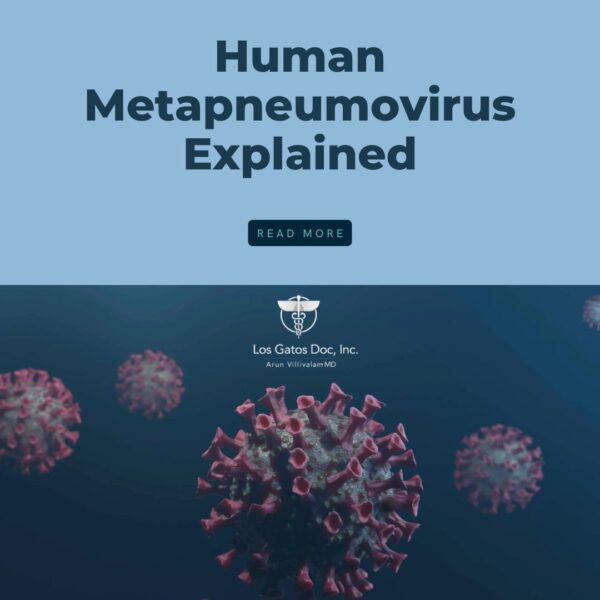It is that time of the year when respiratory illnesses are running amok around us, and while a great deal of focus is kept for the well-known viruses like RSV, the flu, or even COVID-19, there is a new virus on the block that deserves a bit of our 2025 attention: Human Metapneumovirus (HMPV.) Recent surges of the virus in China have caused it to top a few headlines, and rightfully so. This virus can cause a significant amount of respiratory infections, particularly in younger children, older adults, or those with compromised immune systems.
Here at Los Gatos Doc, we know the importance of staying healthy through any season. So let’s take a look at HMPV and focus on the facts: What exactly is HMPV? How does it spread? And more importantly, how can you protect yourself and your loved ones this winter? Let’s take a closer look.
So…What Exactly Is HMPV
HMPV first was detected as a virus in 2001, but even before this time it has been quietly circulating for centuries. HMPV actually belongs to the same virus family as RSV (Pneumoviridae), and much like RSV, it can cause a whole host of respiratory symptoms—from mild cold-like problems to more serious illnesses like pneumonia.
This disease typically peaks in late winter and spring, making it another one of those seasonal viruses that you’ll want to be keen on during these times. According to the CDC, it’s actually one of the leading causes of respiratory illnesses worldwide, especially in more vulnerable populations.
How Does HMPV Spread?
Human Metapneumovirus spreads in many ways similar to other more known respiratory viruses. In short, this means HMPV is highly contagious, particularly in close-proximity or crowded environments. Taking the time to understand exactly how HMPV spreads is critical when thinking about prevention, and your personal risk of infection.
Primary Modes of Transmission
- In the Air: Respiratory Droplets: This virus is primarily transmitted through respiratory droplets which are expelled when any person who is infected sneezes, coughs, or even speaks. These small particles or droplets can be inhaled by others nearby, which leads to infection.
- Touching a Contaminated Surface: HMPV can survive on any given surface for hours, making indirect transmission a true concern. When you touch a surface that has been contaminated—such as a doorknob or countertop—and then touch your nose, mouth, or eyes, you risk introducing this virus into your body. Careful consideration should be taken in shared environments like schools or offices.
- Close Personal Contact: Any physical contact—like hugging, kissing, or even shaking hands—with an infected person can easily spread HMPV. Sharing utensils, personal items, or sips of your favorite drink can also increase your risk of transmission.
- Aerosol Transmission: While not as common, aerosolized particles—otherwise known as tiny droplets that remain in the air for longer periods of time—may also be a cause of transmission, especially in poorly ventilated spaces.
What Are the Symptoms of HMPV?
The symptoms of Human Metapneumovirus (HPMV) can range from mild cold-like discomfort to severe respiratory distress, making it challenging to pick apart from other respiratory illnesses like the flu, RSV, or COVID-19. Symptoms generally appear 3-6 days after one is exposed and can persist for up to two weeks.
Common Symptoms:
- Fever: Often the first indicator of infection.
- Cough: A dry or productive cough that can worsen over time.
- Nasal Congestion: Stuffy or runny nose that mimics a common cold.
- Shortness of Breath or Wheezing: A sign of lower respiratory tract involvement, especially in severe cases.
Severe Complications
HMPV can lead to more serious health issues, particularly in high-risk groups. These include:
- Bronchitis: Inflammation of the bronchial tubes, causing persistent cough and chest discomfort.
- Pneumonia: An infection that inflames the air sacs in the lungs, which may fill with fluid.
- Worsening Chronic Conditions: Individuals with asthma, COPD, or other pre-existing lung
Diagnosis and Testing
If you suspect you have been exposed to HMPV, your healthcare provider will want to recommend certain tests if you are experiencing severe symptoms, or there is an outbreak in your area. Most mild cases are often managed symptomatically. Some of the tests may include:
- PCR Testing: Detects the virus’s genetic material.
- Antigen Testing: Identifies proteins associated with the virus.
- Viral Cultures: Grows the virus from a sample for identification.
Preventing HMPV: Reducing Your Risk
While there is no current vaccine for HMPV, you can take simple steps to remain healthy during the respiratory illness season, and reduce your risk. Remember, HMPV tends to strike in late winter and spring, so keeping on top of personal hygiene during these times is paramount.
- Wash your hands frequently with soap and water.
- Avoid close contact with individuals who are sick.
- Disinfect frequently touched surfaces, such as doorknobs and phones.
- Practice respiratory hygiene, like covering your mouth and nose when sneezing or coughing.
Treatment Options
There is no specific antiviral treatment available on the market for HMPV, so main care for most cases relies on managing your symptoms. Being sure to get adequate rest and hydration will help your body recover. You can also elect to take over-the-counter medications like ibuprofen to reduce your fever and help with discomfort. In more severe cases, oxygen therapy or hospitalization may be necessary. If you are exposed to this virus with any underlying health conditions, you should likely seek help from your primary care physician.
Seeking Medical Help
If you are experiencing symptoms like the ones outlined below, or you have any underlying conditions—a call or visit to your primary care provider should be made to determine your next steps. Some signs to look out for include:
- Difficulty breathing or rapid breathing.
- Persistent high fever.
- Symptoms that don’t improve after a week or seem to worsen.
Time is of the essence with respiratory illness, so identifying any issues early is important, especially if you are at higher risk for complications.
Protect Yourself & Loved Ones
HMPV may not be a household name in the United States as of yet, but taking the time to understand the symptoms, risks, and prevention strategies can help you stay ahead in the coming months from this common respiratory virus. Ensuring you are practicing good hygiene, seeking timely medical care when necessary, and keeping in contact with your primary care physician for regular check ups is one of your best defenses against HMPV and other respiratory illnesses.
If you have particular concerns about HMPV or need general guidance on managing respiratory illness, Dr. Villivalam and the team at Los Gatos Doc are here to help. Located in Campbell, Los Gatos, and Saratoga, CA, Dr. V provides comprehensive care, including respiratory evaluations and preventive health services.
Call (408) 502-6040 today to schedule an appointment and ensure you and your family stay healthy and protected.






